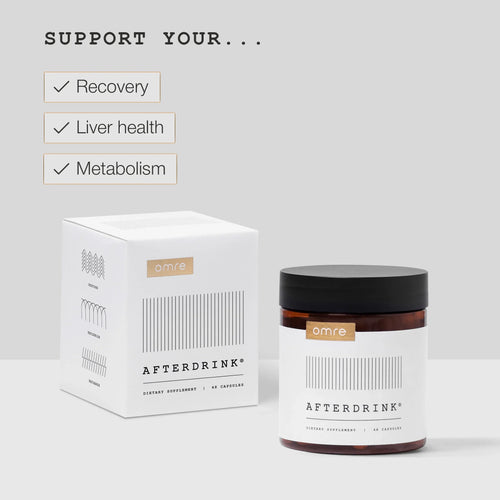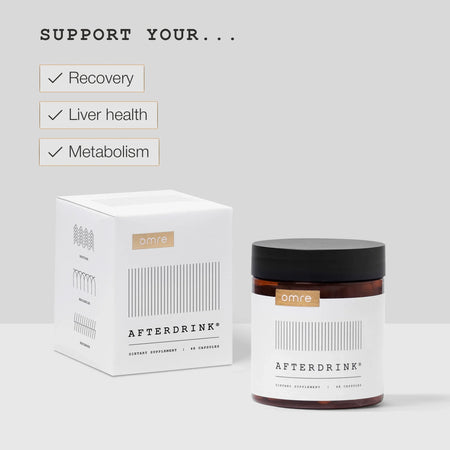Table of Contents
Why do some people not get hangovers? We all know someone who seems immune to hangovers, even though they’ve been drinking all night.
On one end of the spectrum, some people get two day hangovers as standard. And on the other, none whatsoever.
It’s reported that 23% of people don’t experience hangovers at all.(1)
But is it really possible not to get hangovers ever?
In this article, we’re going to take a closer look at the science to see why some people don’t get hangovers.
AFTERDRINK®
A supercharged antioxidant designed to support recovery, made from the very best, research-backed ingredients on the market.*
The science of hangovers
Before we take a closer look at why some people may not hangovers, we first need to go over how alcohol is metabolized in the body and what the causes of a hangover are.
When you drink, your blood alcohol levels start to rise within 90 seconds. As soon as this happens, your liver starts to clear alcohol from your bloodstream by breaking it down to produce energy.
Your liver can only break down alcohol at a certain rate which is typically around one drink per hour. This is massively dependent on your weight, age, gender and metabolism. Therefore, everyone will have a different rate of alcohol metabolism. That said, on average it’s around one drink per hour.
When you drink faster than this rate, your blood alcohol levels continue to rise and you start to feel the pleasurable effects of alcohol. However, at the same time, the backlog of alcohol in your bloodstream puts pressure on your liver as it struggles to deal with the extra load.
As a result, alcohol causes hangovers via the following mechanisms:
1) Inflammation: alcohol is broken down into toxic by-products such as acetaldehyde which react with your cells causing inflammation.
2) Dehydration: Alcohol causes dehydration by blocking a hormone from being released by your pituitary gland called ADH. As a result, your kidneys flush out extra water.
3) Sleep disturbance: Alcohol blocks your brain from reaching the REM stage of sleep which is essential for waking up fully rested.
Although it’s still not completely clear how alcohol causes hangovers, it’s generally accepted that a combination of the above-mentioned factors all plays a role.(2)
So, with the science out the way, let’s take a closer look at whether it’s true that some people don’t get hangovers.
Can you be immune to hangovers?
There are several studies that have looked at various population groups to see whether they get hangovers or not.
Depending on the group of individuals studies, between 10-30% of people reported no hangovers.(3)
That said, most of the studies used groups of students from universities. So they are young, fit and healthy which means their bodies are likely to withstand and repair the damage caused by alcohol better. We all know that hangovers get worse with age! So, this population group isn’t exactly representative of everyone.
Regardless of this, there are people out there who are older and still don’t experience hangovers.
Are these individuals immune to hangovers?
It’s a simple question with a not so simple answer. There are several factors to consider which may impact whether or not some people get hangovers. And that’s what we’ll cover next.
Why do some people not get hangovers?
The reasons why some people don’t get hangovers are different between individuals.
1) How much alcohol consumed
Hangovers are caused by drinking too much alcohol. In essence, when you drink more alcohol than your liver can process, you start to develop hangovers. And the more you drink, the worse hangovers become.
In a study of 789 Canadian students, researchers found that in four-fifths (79%) of those who claimed not to experience hangovers had an estimated blood alcohol level of less than 0.10%.(4)
To put this into perspective, this is around twice the safe driving limits of 0.05% in many European countries such as the Netherlands, France, and Germany. England and Wales, and many states in the USA, have a 0.08% limit.
So 0.10% isn’t far off the safe driving limit. In other terms, the reason why they don’t experience hangovers is probably that they haven’t drunk enough alcohol.
Although we’re not condoning drinking more alcohol to get a hangover, the amount of alcohol drunk has a big impact on whether you experience negative symptoms.
Those who drink and stop before reaching levels that cause hangovers should be applauded. Because ultimately, hangovers are a sign from your body that you’ve had too much to drink.
2) Alcohol metabolism
There are schools of thought that consider those who don’t experience hangovers metabolize alcohol faster. Essentially meaning that they clear alcohol from their bloodstream faster and, therefore, may not get hangovers as a result.
Interestingly, however, a Dutch study found that this wasn’t true in their test subjects. They found that both groups of people who claimed they do and don’t get hangovers had the same pleasurable effects from alcohol. In addition, when they breathalyzed them, the alcohol concentrations reached the same peaks and reduced at the same rate as well.(5)
This suggests that those who don’t get hangovers aren’t experiencing the effects of alcohol differently from a metabolism point of view. That said, they do highlight that their study was small and could have been improved by testing blood samples instead of doing a breathalyzer test.
AFTERDRINK®
A supercharged antioxidant designed to support recovery, made from the very best, research-backed ingredients on the market.*
3) Genetic factors
One of the main by-products of alcohol metabolism is acetaldehyde. It’s a highly toxic substance that reacts with your cells causing inflammation and damage. And exposure to acetaldehyde as a result of drinking is a big risk factor for upper gastrointestinal cancers.(6)
Your body gets rid of acetaldehyde using an enzyme called Aldehyde dehydrogenase (ALDH). Studies have shown that genetic factors that make ALDH work less efficiently are associated with horse hangovers.
Similarly, people who don’t have any ALDH get Asian flush. This is where drinking small amounts of alcohol results in facial flushing (bright red rosy cheeks) as well as hangover symptoms.
Therefore, part of the reason why some people may not get hangovers is because of genetic factors that allow them to clear alcohol’s toxic by-products better. That said, this has not been proven in research studies.
4) Emotional factors
By this, we mean that some people are just less bothered by hangovers. The same as people supposedly have different “pain thresholds”, the same applies to how bad hangovers are experienced.(7)
Everyone is different and reacts to uncomfortable symptoms differently. That’s why the reason why hangovers may pain some people more than others can simply be put down to the fact that it just doesn’t bother them as much.
5) Age
When it comes to hangovers, age is not just a number. Hangovers often get worse with age because our bodies are less able to cope with the damaging effects of alcohol.
So if you’re reading this article aged 21 thinking you’re immune to hangovers, wait till you’re 31 to see if it’s really the case!
In summary: Some people may really not get hangovers. But why they don’t get hangovers is unclear. It’s likely that a combination of the above factors plays a role.
People that don’t get hangovers – the negatives
You may be thinking that it’s great that some people don’t get hangovers. Going out drinking all night and wake up fine. But that’s not really the case.
The negative effects of alcohol are still having a burden on your liver. Just because, for whatever reason, hangovers are experienced less severely, doesn’t mean that alcohol isn’t causing damage to the liver and other organs.
And there are certainly no studies that say that people who are resistant to hangovers, don’t get any alcohol related-illnesses.
It’s also thought that people who don’t get hangovers are more likely to develop problem drinking or “alcoholism”. However, there are conflicting results on this with some studies saying the opposite is true.(8)(9)
Similarly, some studies mention how people who don’t get hangovers will drink more and, therefore, increase the risk of having drink-related injuries.
In summary, being “immune to hangovers” doesn’t mean that excessive drinking isn’t damaging the body. Furthermore, some studies suggest that hangover-resistant people are more likely to develop alcohol dependence in the future. Although that’s still contested.
Why do some people not get hangovers – Final words
That brings us to the end of our detailed look into why some people don’t get hangovers.
We’ve walked you through all the potential reasons. In some cases, it’s because people who don’t get hangovers are sensible drinkers. In others, it could be because of your metabolism and genetic factors.
Research studies report up to a quarter of people don’t get hangovers. But why exactly isn’t so clear.
So, if you’re asking yourself: is it normal that I don’t get hangovers?
The answer is, that you may not be alone. But it’s important to make sure you keep within safe drinking limits regardless because it’s the safest way forward.





